What happens when you get distracted when it’s time to post…
43
Birthday, Thirty Years Earlier — today’s entry from Anne Frank’s diary:
Wednesday, January 13, 1943
Terrible things are happening outside. At any time of night and day, poor helpless people are being dragged out of their homes. They’re allowed to take only a knapsack and a little cash with them, and even then, they’re robbed of these possessions on the way. Families are torn apart; men, women and children are separated. Children come home from school to find that their parents have disappeared. Women return from shopping to find their houses sealed, their families gone. The Christians in Holland are also living in fear because their sons are being sent to Germany. Everyone is scared. Every night hundreds of planes pass over Holland on their way to German cities, to sow their bombs on German soil. Every hour hundreds, or maybe even thousands, of people are being killed in Russia and Africa. No one can keep out of the conflict, the entire world is at war, and even though the Allies are doing better, the end is nowhere in sight.
As for us, we’re quite fortunate. Luckier than millions of people. It’s quiet and safe here, and we’re using our money to buy food. We’re so selfish that we talk about “after the war” and look forward to new clothes and shoes, when actually we should be saving every penny to help others when the war is over, to salvage whatever we can.
The children in this neighborhood run around in thin shirts and wooden shoes. They have no coats, no caps, no stockings and no one to help them. Gnawing on a carrot to still their hunger pangs, they walk from their cold houses through cold streets to an even colder classroom. Things have gotten so bad in Holland that hordes of children stop passersby in the streets to beg for a piece of bread.
My Amelia Earhart Report
Amelia Earhart was born in Atchison, Kansas July 24, 1897. She was a hero to many people because she flew long distances like fly across the Atlantic Ocean.
When Amelia Earhart was a child she was the first to try new things. After the World’s Fair she and her friends tried to build a roller coaster. She was the first to try it and she got hurt. She liked to go fast and was very brave. Once in the winter it snowed. Amelia and her friends went sledding. She had to duck under a horse not to get hurt.
When she was an adult, she flew long distances alone. She was a woman and the first woman to fly across the USA and the Atlantic Ocean.
She wanted to be an independent woman. She didn’t want to marry just any man. First Sam Chapman asked to marry her and then later he asked again. Amelia said “no” twice. Then George Putnam asked to marry her. Amelia took the risk and said “yes.”
Amelia Earhart’s plane disappeared when she was trying to fly across the world on July 2, 1937. Fred Noonan was one of Amelia’s helpers. He was trying to navigate to Howland. It was a tiny strip of sand, and they couldn’t spot it. The fuel ran out, and they crashed. No one ever found her.
If I could ask Amelia Earhart a question I would ask her this “Why did you risk marrying George Putnam?”
The First Battle of the Marne
They don’t know what awaits they, but by now, they realize it’s not what they thought it would be.
Joyeux Noel: The Christmas Miracle of 1914
When I was in college, I was not a Deadhead — I never even saw the Grateful Dead in concert — but I was something of a McCutcheon-head, if there be such a thing. John McCutcheon is a multi-instrumentalist folk singer who is equally at home singing his renditions of spirituals and his own songs for children. In college, I saw him in concert a number of times, and there was always one song that left me truly enchanted. He introduced it most times in a similar way, telling of a concert he’d given in the early eighties when an elderly man approached him and, speaking of his song “Christmas in the Trenches,” said, “Young man, I was there.”
This was pre-internet days. One couldn’t simply Google “Christmas miracle 1914,” and it wasn’t a story I heard in history class. And that’s really too bad.
After hearing that story, I thought, “This is a fantastic story — why hasn’t anyone made a film of it.”
Tonight, K and I watched Joyeux Noel, and as I read the Netflix disc-cover summary, I thought, “Is this about that thing John McCutcheon sang about?” Indeed, it is. Well worth viewing.
Side Note
John McCutcheon is best known for his mastery of the hammered dulcimer. I once saw him in concert in Asheville, North Carolina when the power went out in the middle of a hammered dulcimer song. McCutcheon literally never missed a note though it was pitch black for at least thirty or forty seconds.
Future in the Past
Some of the names are unfamiliar; some are vaguely familiar, but we don’t necessarily know off the top of our heads what the person did. And some are infamous.
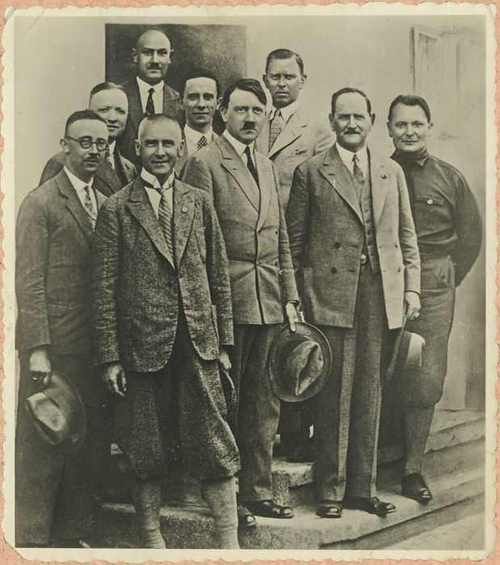
Wilhelm Frick was responsible for many of the laws that consolidated the Nazi regime. Shortly after the passage of the Enabling Act, Frick helped create a law taking power from individual state governments in Germany, thus federalizing power under Hitler. This accomplished, Frick played an important role in the racial policy of Nazi Germany, helping to create laws against German Jewish. For all this, he was determined enormously responsible for the existence of concentration camps and was hung.
Fritz von Epp abolished the government of Bavaria on Hitler’s and Frick’s orders and set up a Nazi government. He died of natural causes while in Allied custody.
Martin Mutschmann was the Nazi governor of Saxon and was shot by the Russians in Moscow in 1947.
Julius Schaub was chief aide and adjutant and was responsible for destroying all of Hitler’s personal belongings and papers. He died in Munich in 1967.
Otto Strasser is something of an anomaly in this picture. He considered himself a leftist Nazi, and lacked the virulent anti-Semitism of the rest of the group. Hitler expelled him from the Nazi Party, and he helped form the Black Front, an attempt to split the Nazi Party. He spent the war outside of German, eventually settling in Canada. Goebbels declared that Strasser was the Nazis’ “Public Enemy Number One” and put a price of $500,000 on his head. He returned to Germany in the fifties and died in Munich in 1974, all the while calling for a renewed Nazi party.
Those are the men we don’t know. The other four are arguably among the most evilly influential men of the twentieth century, responsible for the deaths of millions upon millions upon millions. Adolf Hitler, Hermann Goering, Heinrich Himmler, and Joseph Goebbels constituted the very upper echelon of the Nazi party, and as such, are responsible for the Second World War, the Holocaust, and in a very real way, the Cold War. And not a single one of them faced justice of any kind. All four committed suicide, Hitler and Goebbels killing themselves (and their wives, and in Goebbels’s case, children) before the fall of Berlin, and Goering and Himmler committing suicide after their capture.
Yet the past threatens to become our future as well. Gudrun Burwitz, daughter of Himmler, is an unrepentant neo-Nazi and works hard for years to help the remaining war criminals escape justice. It’s people like that who feel that Hitler didn’t go far enough, mourn the fact that Jews still exist, and cheer at the thought of Iran following through with its threat against Israel. “Have we learned nothing?” is the only thing that comes to mind in situations like that.
Warsaw Winter
Hungary had its 1956 uprising, when it appeared that the Soviet satellite might gain its independence. The USSR moved in and reasserted control by force.
Prague had its Spring: reforms and liberalizations in 1968 by the puppet Communist regime that eventually warranted a full scale invasion by the Soviets to settle things down.
Poland never experienced such a “corrective” invasion, though there was always the thought that the Soviets might have invaded had Jaruzelski not imposed martial law on December 13, 1981. Lech Wałęsa’s Solidarity party was gaining too much influence and there was concern that unrest might spread throughout the nation.
The conventional Polish wisdom (as I understood it) has been that Jaruzelski imposed martial law in a bid to preempt a Soviet invasion. Antoni Dudek, a Polish history professor, has published on his blog contents of a note Jaruzelski said to Viktor Kulikov, a Soviet general,
Będzie gorzej, jeżli wyjdÄ… z zakładów pracy i zacznÄ… dewastować komitety partyjne, organizować demonstracje uliczne itd. Gdyby to miało ogarnąć cały kraj, to wy (ZSRR) bÄ™dziecie nam musieli pomóc. Sami nie damy sobie rady”.
It will be worse if [the protests] spread from the workshops begin devastating the party committee, organizing street protests, etc. If it were to spread throughout the country, you (the USSR) would have to help us. We couldn’t manage it alone.
And so the possibility for a Polish Winter to match the Prague Spring was very real.
WałÄ™sa, in the meantime, has suggested that Jaruzelski might be brought up on charges of treason. Dudek admitted that while WałÄ™sa usually likes “strong words,” these words might indeed be “adequate.”
Jaruzelski of course denies all of this. Words were taken out of context. Shades of meaning have been applied that were not intended. It seems to be just the beginning, and given the generally closed nature of the Polish archives (compared to the open archives of the former East German government), it seems a resolution is distant, if not impossible.
Dudek’s blog is available here. The Onet story includes information about WałÄ™sa’s reaction. Hat tip to the beatroot.
Shock and Disbelief
In preparing to read the dramatization of Anne Frank’s diary, I spent some time going over the Holocaust with students. I was taken aback at how little they seemed to know about it. “A bunch of people — I think they were Jews — got killed” seemed to be the general view. They do know something about it now, but their questions revealed both how complicated and unfathomable such an act is.
Most common was, “Why did they hate Jews?” Why indeed? Many answers, none of them short and simple. I offered a few: notions of Jewish conspiracies; Jews as “Christ killers” and the old blood libel; the fact that there are a substantial number of Jews in banking (which is directly traceable to early Christians’ reluctance to engage in usury) as proof of some international Jewish conspiracy. All those explanations in turn (which is why I was silent about The Protocols of the Elders of Zion).
As I spoke, though, and showed pictures and short clips of survivors, it was almost eerie how closely they paid attention. Any noise brought immediate shushing, and the look of shock on everyone’s face told me that there is at least one thing they’ll remember from their time with me.
On the Ground
I’m left wondering how much the average German soldier knew about the plans for the inhabitants of the land they were invading. Did they realize that, ultimately, all Poles were to be made slaves or exterminated? That all Jews were considered subhuman, and the “logical” consequences of that?
I’m reading Blitzkrieg in their Own Words: First-Hand Accounts from German Soldiers 1939-1940.
The jacket description explains that the book was written during World War II.
Written in the naive, fresh style of young men new to combat, the texts recounts the ruthless destruction of the Polish and French armies in language that shocks in its brutal enthusiasm.
One writes about the “criminal insanity of the Poles.”
Also striking is the awful irony of some of the descriptions. One soldier writes about being ambushed in a Polish village. “Civilians and soldiers out of uniform are engaging in nasty, criminal warfare.” It doesn’t require perfect hindsight shows us the hypocritical irony of the soldier’s statement: it was true even as he wrote the words.
Lions, Poles, and Japs! Oh My!
Several of my Polish friends spoke of having to re-learn some elements of history after the fall of Communism in the late 1980s. History (as well as art, music, the social sciences, and even the physical sciences) was dominated by ideology. Because Communism represented the pinnacle of human achievement, something “the masses” for centuries had been working for, it could not be wrong. It had become a religion, in that sense. And so the mistakes and crimes of the Soviet government were recast as wise planning that had been necessary; the achievements of capitalist countries (read: America and Western Europe) were due solely to capitalists’ deviousness, usually stealing the ideas from the honorable Socialists.
With the fall of the Soviet empire, it seemed that such nonsense would never happen again. Yes, well, it has. As Putin seeks to rebuild Russian strength, he’s turning to nationalism, stoking a pride in the achievements of Soviet Russia. This means recasting a few, unpleasant episodes in Soviet history. No worries, though: “We’ve done it before,” Russian media services must be thinking. “We can do it again.” And so youngsters in Russia will be learning “history” that’s a little different from, well, reality.
A few highlights:
- The Molotov-Ribbentrop Pact was not an agreement with Nazi Germany to split Poland between the two of them. It was a defensive move, for Poland and Japan were planning a two-pronged attack on the Soviet Union. (Source)
- World War II began when Germany attacked Russia in June 1941. The rape of Poland that began almost two years earlier was a defensive move, remember? (Source)
- Stalin’s purges and mass murders were entirely rational and logical — for the good of the country. (Source)
The bottom line: Stalin is a hero who was defending the country from malicious outside influence and outright Polish/German aggression.
The temptation is to mutter something about this never happening in America, but of course it does. The whole premise behind Howard Zinn’s A People’s History of the United States (Amazon) is just that. It’s a play on the maxim, “history is written by the winners,” which means the losers are misrepresented and underrepresented.
A few highlights:
- America was founded as a Christian nation.
- The rise of American power has always been a benign influence on the world.
- American foreign policy has always been a beacon of reason and justice; America respects democracy worldwide.
Not all of these myths are taught or were taught in school, but they are spread evenly enough in our collective conscious (and conscience, possibly) that they might as well have been. And, to be fair to America, the notion that America was founded as a Christian nation is not all that morally repulsive (it only becomes so when one sees that believe in action); the notion that Stalin’s purges were ethically justifiable is completely morally repulsive.
But there is a level playing field now: thank God for the Internet, that beacon of tried and true information. It will surely save Russians and Americans alike from the national myths.
Source: the beatroot
Hail Obama, Hail Mary
The Rev. Jay Scott Newman, parish priest at St. Mary’s Catholic Church here in Greenville, writes on his blog about being Catholic in a decidedly evangelical region:
St. Mary’s Catholic Church is located less than five miles from the campus of Bob Jones University in the Buckle of the Bible Belt, a part of the world in which many Protestants still regard Catholicism as a pagan cult pretending to be a Christian Church or, at best, a fatally compromised version of the true Gospel. In such an environment, those who are casual, cultural, and cafeteria Catholics quickly become either ex-Catholics or Evangelical Catholics, and that is paradoxically one of the reasons why our congregation and many other Southern parishes are flourishing: the unique challenge for Catholics seeking to live their Christian faith in the South leaves no room for spiritual mediocrity, doctrinal confusion, uncertain commitments, or a lukewarm interior life. (Unexpected Catholicism)
What he said to a Greenville News reporter was sure both to unite and to alienate Evangelicals and Catholics. Hitting upon that common conservative Christian motif of “abortion is the greatest evil on the planet today” and Democrats are evil because they support it, Newman suggested Catholics who voted for Obama might not be fit to receive communion:
The priest at St. Mary’s Catholic Church in downtown Greenville has told parishioners that those who voted for Barack Obama placed themselves under divine judgment because of his stance on abortion and shouldn’t receive Holy Communion until they’ve done penance. (GreenvilleOnline.com)
The Greenville Times is even putting it on the front page, so to speak:

This is reminiscent of the calls in 2004 not to give communion to pro-choice Catholic candidates (read: John Kerry). CBS News explained it thusly:
It is unclear if pressure from the Boston archbishop will prevent Sen. John Kerry from taking communion this Easter Sunday in his home city because of the Democratic nominee’s support for abortion.
Amid questions of how Catholic leadership will respond to the pro-choice senator, Kerry’s archbishop — Boston’s own Sean O’Malley — has refused to clarify a statement last summer that pro-choice Catholics are in a state of grave sin and cannot take communion properly. (CBS)
Newman’s letter itself is here.
What next? People who are friends of voters who voted for candidates who are pro-choice have to get aboslution? Parishoners who touch dogs of friends who have friends who have friends who heard about someone who voted for Obama must confess?
This kind of blatantly political crap should be just cause for revoking a church’s tax exempt status.
Yet a few commenters put it in perfect perspective:
- I am confused. Rev. Newman forgives John McCain for his sin of adultery; he forgives Sarah Palin for her sin of fornication and for raising a child to be a fornicator. On the other hand, he opposes a family man.
- Maybe the priest should refrain from taking communion until the Roman Catholic Church does enough penance for it’s willful coverup of well over 10,000 child sexual abuse cases for decades.
- This is the reason why the Catholic Church has no credibility what-so-ever.
- Sorry Father. I am a practicing Catholic who attends mass each week at your Church. This election was multi-dimensional. I abhor abortion, but there were so many more issues involving human lives at stake last Tuesday. By the way, the headline of this week’s Catholic Miscellany, which you sent me reads “Pope Congratulates Obama on Election Win.” In the article, Pope Benedict says an awful lot of nice things about President-Elect Obama. Did you clear your opinion with Rome?
Sputnik
A fascinating article on the political impact of Sputnik
Sputnik Stunned the World, and Its Rocket Scared the Pentagon
Teaching Trotsky
Given the fact that the lads in the program had a very weak grasp on recent history, I decided to do a six-weeks’ grading period on 20th century history. A hundred years in six weeks means 16.7 years per week, and I knew it would be a very rough overview at best. That said, I started in 1917, with the Russian Revolution.
“Why are we studying this crap?” one asked. He’d been keen on learning about the 20th century, but an obscure revolution led by people with “weird” names in a country on the other side of the globe was not what he had in mind.
“Because what came out of the revolution, namely the Soviet Union and the totalitarian Communist state, shaped much of the 20th century.” Already I knew that I was painting with broad strokes. The revolution had produced a communist state, but it wasn’t immediately totalitarian — unless you happened to be in the upper class. Value judgments aside, I went on.
We looked at the revolution, the outcome, and then spent most of our time on the Stalinist Soviet Union.
The classic free-market critique of communism is that it destroys incentive. If I’m going to get my needs met whether or not I work, why should I work? If I know that no matter how hard I work, I’m going to get the same rewards, why not just do what’s necessary to get by? I used to think “Whether or not this argument is valid on a scale large enough to make an impact on society’s production remains to be seen,” but then I lived in Poland in the years just after the fall of communism. What I experienced were people who were supposed to be helping me — after all, by my shopping in their store, I was paying their salary — sitting and reading a newspaper, then looking up with an expression of disgust and saying, “What?”
A consultant who’s been working with our program mentioned later, as an aside admittedly unrelated to his job description, that he felt I’d painted with strokes too broad and therefore misleading. He felt I’d blurred the lines between Stalinism and communism and that the lads would equate the two as being necessarily connected, synonymous even.
“Communism doesn’t have to end in totalitarianism,” he pointed out.
True enough, but I began thinking about this and realized something that one thing missing from the discussion is scale. To have a small-scale commune is one thing; to have an entire country that is communist is something entirely different. Small-scale communism can work because it can foster a tighter community spirit — it can be more like “family.” You’re less likely to cheat someone whom you know, with whom you share common values, etc. Small-scale communism also tends to be more voluntary. Choice goes a long way in determining how much you’ll play “within the rules” of a given society. Bottom line, because of the community sentiment and the voluntary nature, small-scale communism tends to be ideologically self-sufficient.
Marxism suffers from fatal oversimplification: all workers are saints and all owners are devils. There are saints and sinners among workers and owners alike, and communism cannot overcome the inherent selfish nature that so many of us have.
State-scale communism, however, is not ideologically self-sufficient, and it’s largely anonymous. Corruption arises more easily when you have no idea whom you’re cheating. Add the fact that communism historically has not been “voluntary” and you have an instant recipe for Animal Farm-type “cheating.” And since it’s not voluntary and the state has to keep a lot of people “in line,” it’s easy enough to evolve into a police state.
Talking with the consultant later about this, I sketched out the above thoughts, concluding that, to my knowledge, there’s not a single modern communist state that hasn’t evolved into a totalitarian regime.
He suggested Cuba. Aside from the imprisoned political dissidents, the fact that Cubans are shut up behind their own “Iron Curtain”, and the lack of any oppositional political party, I guess I’d agree…
Hell
Kinga and I went to Auschwitz-Birkenau today.
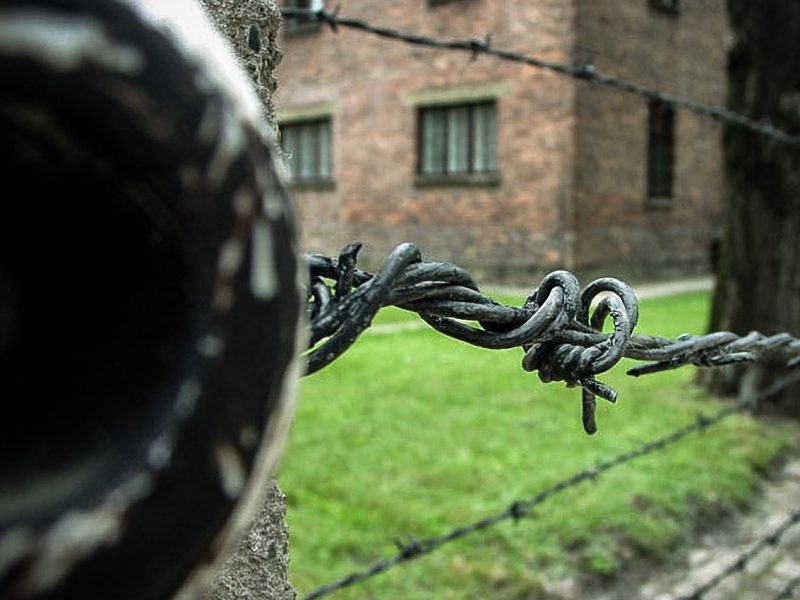
It’s only now that I can appreciate the scale of the Holocaust. Reading Hitler’s Willing Executioners, seeing Schindler’s List, thumbing through albums – it’s not the same. Walking under the sign, “Arbeit Macht Frei,” standing in a gas chamber, walking along the barbed wire, standing by the railroad tracks where the selection was made – only then did the number of Holocaust victims (up to ten million) begin to take on any personal, tangible significance for me.
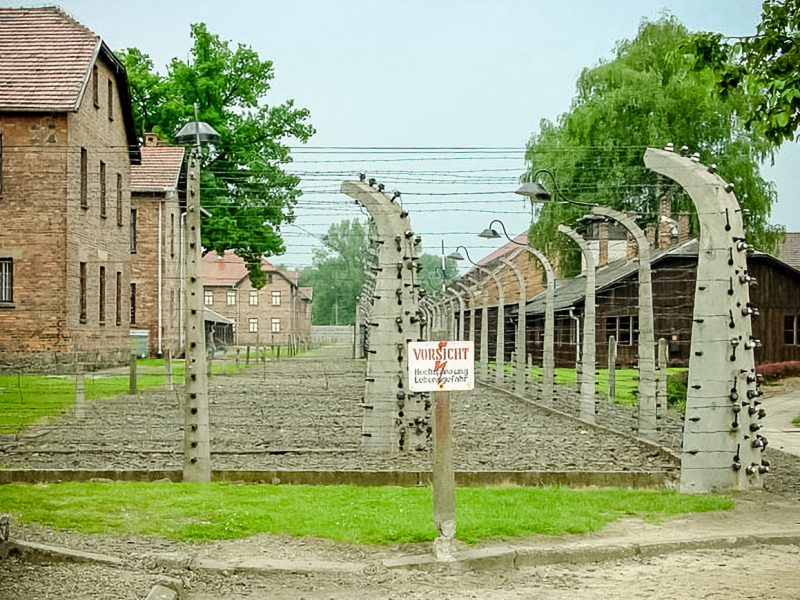
Auschwitz (the main camp — Auschwitz I) is surprisingly small. A former Polish army base, it doesn’t have such an immediately ominous feel if you ignore the barbed wire and guard towers. Single and double story buildings laid out in a grid, with grass growing in between and birds singing. It could easily be mistaken for an old prison. In fact, that’s really what Auschwitz was.
Despite it’s being associated with genocide, it wasn’t an extermination camp, per se. It was a prison and work camp. That’s not to say that death wasn’t everywhere. Indeed, it was. But it was not a death factory on an imagination-defying scale.
Birkenau was.
Birkenau is three kilometers from Auschwitz, and is actually one of several sub-camps. It was known as Auschwitz II, and it served one purpose: destroying humans.
Birkenau is Auschwitz, for Auschwitz is the synonym of death in the Holocaust, and Birkenau, with its stark and lethal geometry, is the machinery we always imagine when we think “concentration camp.” If one can use the words “stereotypical concentration camp,” then that’s the perfect description of Birkenau.
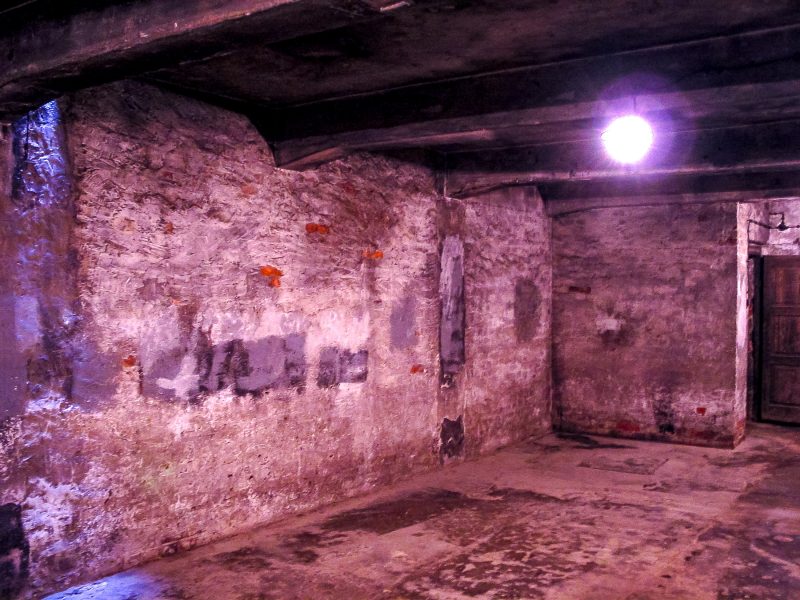
At Birkenau, Nazis had two gas chambers and (as I recall) six crematoriums. Nazis processed humans like animals – herded out of the cattle cars, stripped naked, gassed, shaved and checked for gold teeth, then burned.
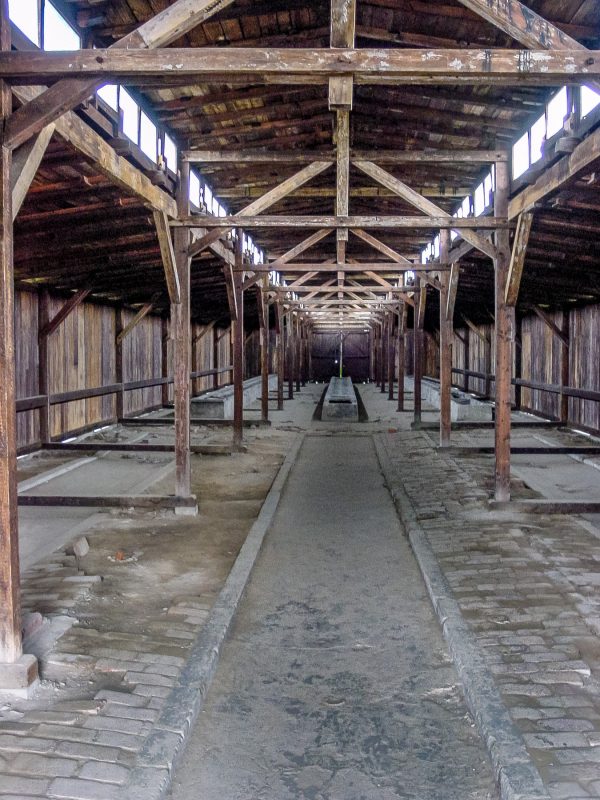
It’s the monotony of Birkenau that is sickening. A mile and a quarter by a mile and a half, it’s an enormous camp that had three hundred barracks and housed up to 100,000 people. About sixty of the barracks remain intact: forty-some brick and twenty-some wooden structures stand in the camp, with countless chimneys marking the ruins of the rest.
Most all of the barracks are open, and most all look the same. It’s that monotony – after a few barracks, you don’t even go into them anymore – that made me realize the true horrific scale and monstrosity of the Holocaust. Nazis lulled themselves into a rhythm of killing that resulted in literal mountains of corpses.
Something had to be done, so they started burning bodies. But this was not efficient – shooting people, then making huge bonfires. No – much more efficient to make an assembly line of death. And that’s what they did at Sobibor, Treblinka, Birkenau, and many extermination camps. Day in and day out, trains arrived, people were slaughtered, and the Nazis went back to their warm barracks and listened to Bach and wrote letters to their wives. Assembly line – everything at Birkenau screams it. Lines of barracks, dissected by a railroad track, surrounded by a fence. It’s geometrical, exact death.
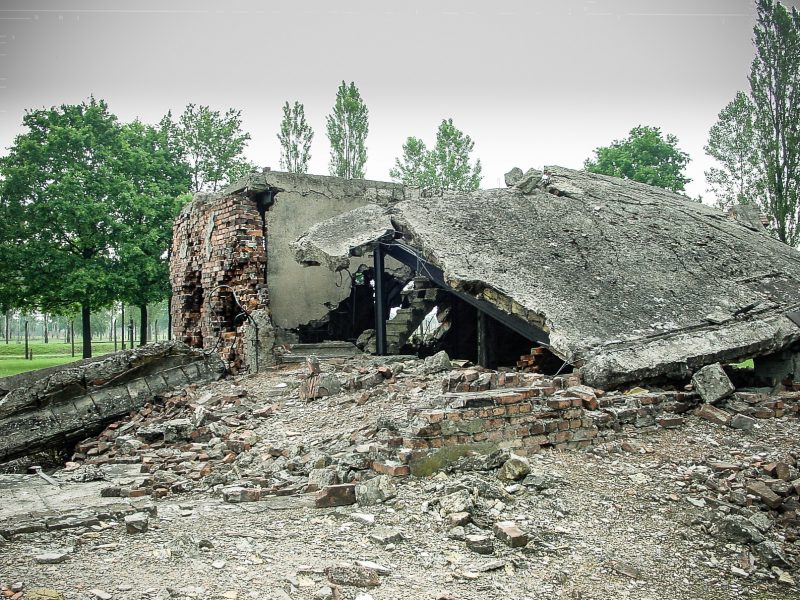
Death times one point five million, to be precise. That’s the death toll of Auschwitz, and it means as you walk along the grounds, you’re walking on literally blood-soaked earth. It’s one of the few places in the world, I would say, where you can throw a stone and know it will probably land within a foot of where someone died. Within inches. Rather, at the very spot.
You walk in the barracks, running your hand along the bunks, realizing that every single morning, the inmates awoke to find someone else had died in the night. And as you’re running your hand along the bunks, you realize that they died in this bunk. And in this one. And in this one. In all of them, chances are.
There is not an inch of that ground that has not seen death, and it seems to root the buildings to the place and make it difficult to lift your legs as you walk.
Tourists crawl over Auschwitz. They’re literally everywhere. Tour groups weave in and out of the barracks and through the streets, making it impossible to be alone. And the languages you hear – Japanese, Arabic, Spanish, French, English, Hebrew, everything.
And you hear German. We bumped into at least two German tour groups, and it somehow seemed eerily appropriate to hear German in that place.
Birkenau, in contrast, has much fewer tourists. Its sheer size, compared to Auschwitz, means more privacy, less competition with other visitors. The parking outside is probably one-tenth, if even that, of what’s outside Auschwitz, and yet it makes such a bigger impression.
My stomach churned the entire time, and for one brief moment, I was sure I was going to vomit. It was in one of the exhibits in Auschwitz, housed in the barracks. Hair – a literal mountain of hair, shaved from victims’ heads after being gassed. The hair provides proof to anti-Semitic Holocaust deniers because there remain traces of Zyklon-B in the matted, filthy hair. There are over fifteen-hundred pounds of hair in the exhibit, and at the near wall, just as you enter, is the spot I grew so nauseated that I had to go to the window to get air.
Fabric, woven from human hair, intended for clothes. An entire bolt of cloth – who knows how many were produced in total – with bits of hair placed on top.
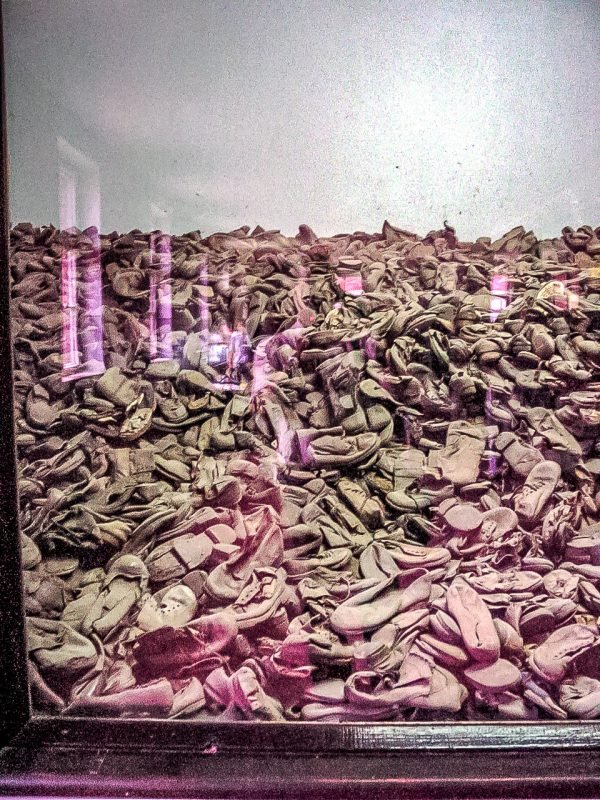
There are hideous mountains throughout the exhibits: of shoes, of combs, of suitcases, of pots and pans and other kitchen utensils, of twisted eye-glasses, of artifical limbs. There are piles of shoe-polish tins, face-cream tins, forks, spoons, baby shoes.
It’s too much. You just want to scream.
The most tragic part for us, in the twenty-first century, I told K as we walked along the train tracks in Birkenau, is that there are thousands, even millions, of people who would gladly see this camp open and operational again. I wasn’t just referring to the anti-Semitism that still haunts our world, the young Neo-Nazis who deny that the camps were death camps – Hitler didn’t know; Hitler got a bum rap; and other absurdities – and yet know what the camps were used for and would like to see them killing again. I was referring to the guards and others responsible who are still living, some of whom no doubt regret that Hitler didn’t finish what he started.
What would have happened if Hitler had won the war? Birkenau leaves little doubt. The Jews would be non-existent, as would Slavs, Roma (Gypsy), blacks, Asians, and anyone else who offended Nazi sensibilities.
What’s most astounding about the concentration camps is that they, to some degree, cost Hitler the war. Hitler could have fought to a stalemate, then resumed again when his forces were strengthened. But what did he do? When supplies were needed at the front, instead of decreasing the shipments of victims to camps and using those trains to get supplies to the army, he increased the number of shipments. The pace stepped up as the inevitable loss approached. The Nazis’ hatred literally consumed them in the end. Its irrationality overwhelmed the cooler heads needed for military strategy, and reduced Nazi leadership to foaming-at-the-mouth, obsessive maniacs.
It’s not just the scale of victims that comes into sharp focus at Birkenau. The number of perpetrators – mostly German, but with help from other collaborators – required to murder that many people becomes obvious. It was not a handful of Nazis that did this. A significant percentage of the European population (again, the vastly overwhelming majority Germans) was mobilized to slaughter ten million people like household pests. And yet, at the Nuremberg trials, Allies brought forward only 24 indictments, resulting in 10 death sentences.
What about the others? If there are surviving victims sixty years later, there are surviving perpetrators. How do they live with that? How can they sleep knowing what they did and what they saw?
It’s another aspect of the Holocaust that defies all sense of reason and decency.
Last night, looking at pictures I took, it seemed like a nightmare. Even when I was living the experience, it seemed dream-like and intangible. Walking around the camp, seeing the barbed wire and barracks and train tracks, imagining what it was like to be interned there, thinking about what happened – it all seemed unreal.
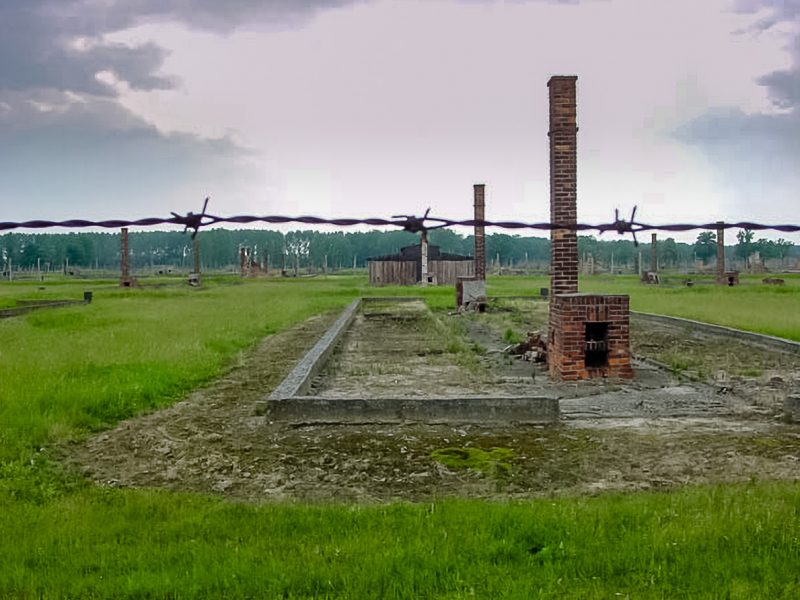
Such is the scale of the Holocaust that even when you’re in the center of the hell it created, it seems impossible. How can people do this to one another? You stand there in the incontrovertible proof of the Holocaust’s reality, and yet it seems insanely unimaginable. “What kind of an individual would think of such a thing, let alone put it into practice?”
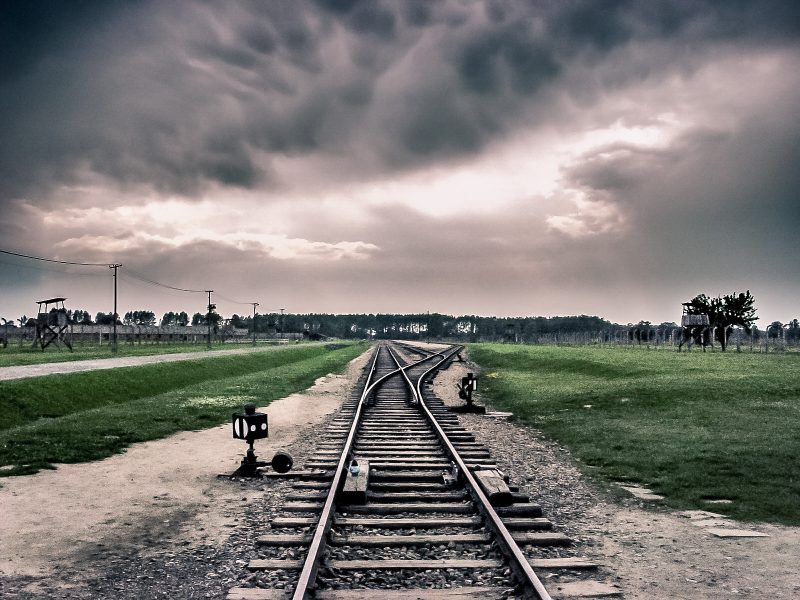
I’ve seen it, but I’m even further from understanding it.
(Re-published for the yea write. Photos re-edited June 2021.)
Polish Pride
Today is a huge holiday in Poland. In 1920 Polish forces turned back a larger Russian army, thus saving Europe from the Bolshiviks. Obviously this is a matter of great national pride. In addition to the national secular importance of the day it’s also the day of assumption.
In Warszawa at the arched memorial with the eternal flame in front of the fountain (Kristine and I visited this place. In front of it is a great square.), there is a great military ceremony. Representatives of all armed forces are there as well as high ranking statesmen including President KwaÅ›nieski. It is a moving sight – much national pride. I hope I can be in Warszawa this time next year so I can see it for myself.